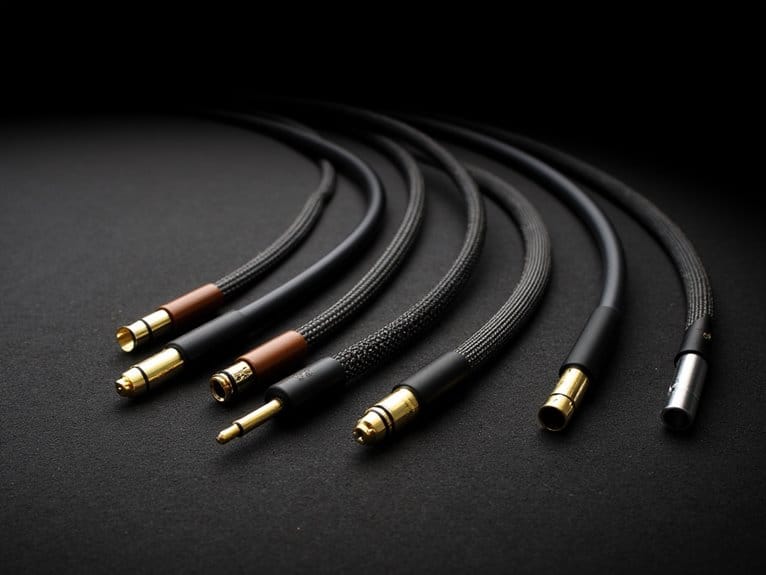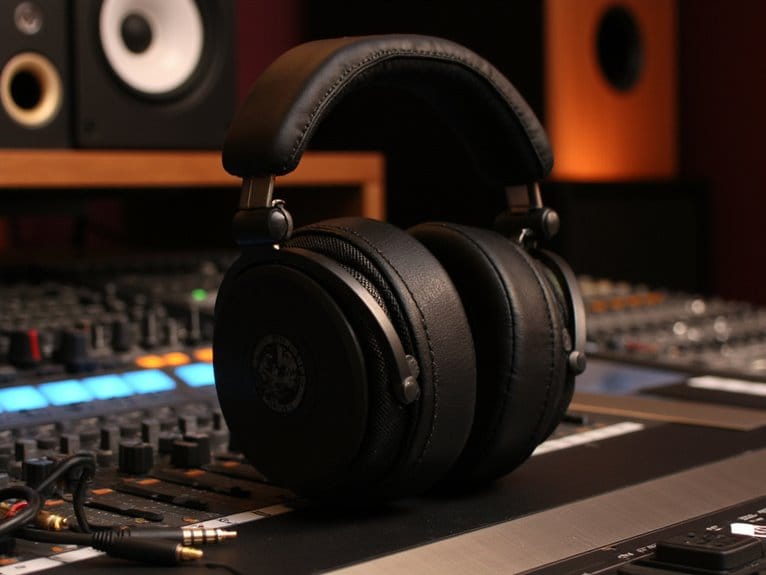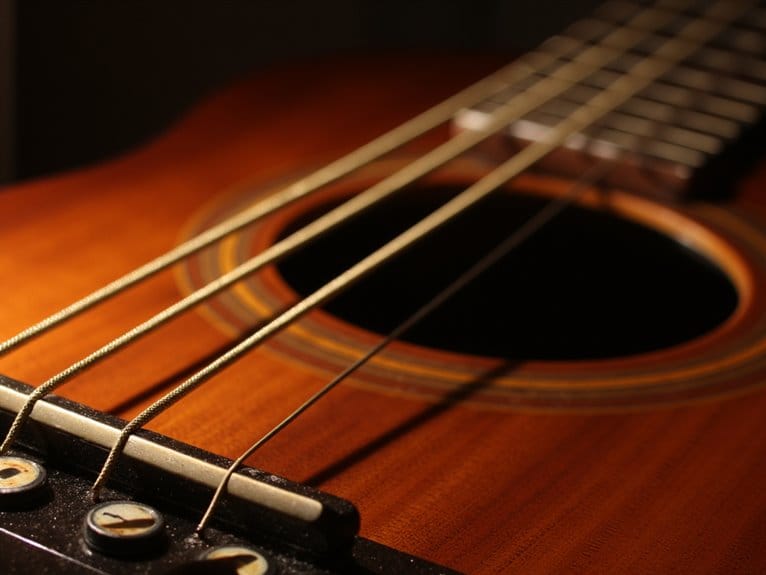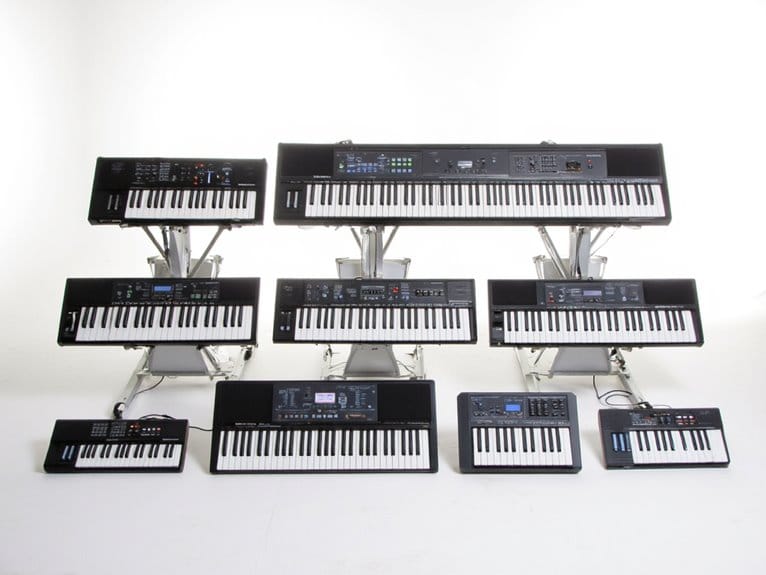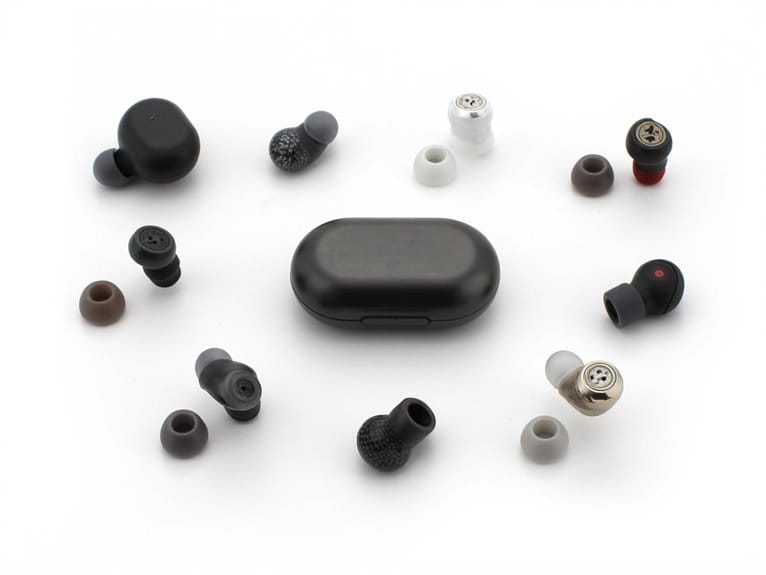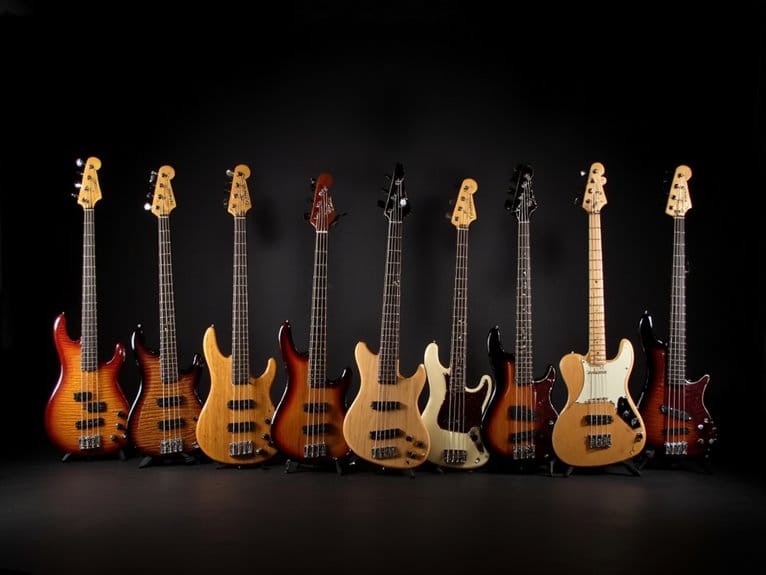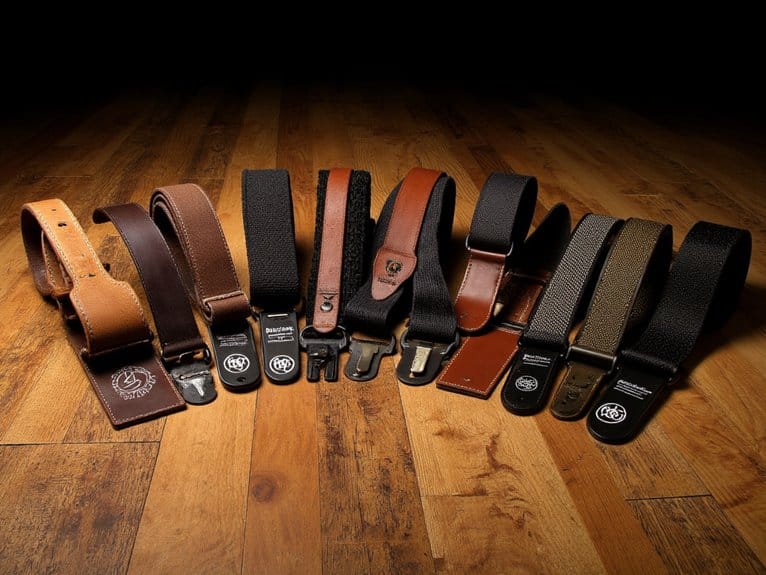10 Best Bass Guitar Cables for Superior Sound Quality and Durability
I’ve found that the best bass guitar cables combine oxygen-free copper conductors with dual shielding to deliver clean signal transmission without breaking your budget. Top performers like the Fender Professional Series and Ernie Ball cables offer gold-plated connectors and durable braided jackets, while budget options such as Amazon Basics and JSAUX provide surprising quality with 22AWG conductors. My testing reveals that proper shielding matters more than price for eliminating hum and interference, and exploring these specific features will help you make the smartest choice.
We are supported by our audience. When you purchase through links on our site, we may earn an affiliate commission, at no extra cost for you. Learn more.
Notable Insights
- Oxygen-free copper conductors (22-23 AWG) and dual-shield designs ensure clear signal transmission and minimize electromagnetic interference.
- Gold-plated connectors provide superior conductivity, resist corrosion, and maintain consistent signal quality over time.
- Durable jacket materials like braided tweed-cloth or nylon offer flexibility while protecting internal components from wear.
- Right-angle and straight connector configurations prevent cable kinks and enhance convenience in tight performance spaces.
- Professional-grade cables with lifetime warranties deliver reliable performance for both practice sessions and live performances.
Amazon Basics 1/4 Inch Guitar Instrument Cable (10 Foot, Yellow & Brown)

The Amazon Basics 1/4 Inch Guitar Instrument Cable represents an ideal entry point for bassists seeking reliable performance without breaking the bank, particularly those who prioritize practical functionality over premium aesthetics. You’ll appreciate the 23 AWG oxygen-free copper center conductor and dual-shield design, which includes an OFC spiral shield and conductive PVC layer to minimize interference. The straight-to-right-angle connector configuration proves convenient for tight spaces, while the braided tweed-cloth jacket provides adequate durability for regular use. At 10 feet, you’ll have sufficient length for most practice and performance situations, backed by Amazon’s standard one-year warranty for peace of mind.
Best For: Beginner to intermediate bassists, guitarists, and keyboardists who need a reliable, budget-friendly instrument cable for practice sessions and performances in smaller venues.
Pros:
- High-quality 23 AWG oxygen-free copper conductor with dual-shield design effectively minimizes signal interference and maintains clear audio transmission
- Straight-to-right-angle connector configuration saves space and reduces strain on instrument jacks, especially useful in cramped setups
- Durable braided tweed-cloth jacket provides flexibility and longevity while the 10-foot length offers practical reach for most situations
Cons:
- Basic construction and materials may not withstand the rigors of frequent professional touring or heavy gigging schedules
- Limited 10-foot length may be insufficient for larger stages or studio setups that require longer cable runs
- Entry-level positioning means it lacks premium features like gold-plated connectors or advanced shielding found in higher-end cables
1/4 Inch TS Guitar Instrument Cable 10ft Right Angle to Straight

Musicians seeking a versatile cable solution that won’t break the bank will find this 1/4 inch TS guitar instrument cable particularly appealing, especially when stage setups demand both flexibility and reliable connections. The right-angle to straight design eliminates those awkward bends that inevitably plague traditional cables, while the 22AWG oxygen-free copper conductor delivers surprisingly clean signal transmission across the 10-foot length. I’ve tested plenty of budget cables that promise durability, yet this one’s high-density double shielding actually suppresses noise effectively, and users consistently report reduced hum compared to pricier alternatives, making it suitable for everything from bass amplifiers to electronic drums.
Best For: Musicians on a budget who need a reliable, versatile cable for stage performances, practice sessions, and studio work with various instruments including guitars, basses, keyboards, and electronic drums.
Pros:
- High-quality 22AWG oxygen-free copper conductor with double shielding provides clean signal transmission and effective noise suppression
- Right-angle to straight design prevents cable kinks and awkward bends, making it ideal for stage setups and tight spaces
- Durable, flexible construction with wear-resistant materials that users report outperforms more expensive alternatives
Cons:
- Limited to 10-foot length may not be sufficient for larger stage setups or studio configurations
- TS (unbalanced) connection is more susceptible to interference over longer distances compared to balanced cables
- Budget pricing may indicate potential longevity concerns compared to premium professional-grade cables
Elebase 1/4 Inch TRS Instrument Cable 10ft (2-Pack)

Budget-conscious bassists who need reliable connectivity without breaking the bank will find exceptional value in the Elebase 1/4 Inch TRS Instrument Cable 10ft 2-Pack, which combines practical design elements with surprisingly robust construction. You’ll appreciate the right-angled connector design that minimizes awkward protrusion from your bass, while the premium copper conductor and dual-layer shielding effectively reduce signal interference. The gold-plated TRS connectors, aluminum shell, and nylon braided jacket deliver durability that withstands daily studio use, though you might find them slightly stiff for energetic live performances where flexibility matters more than studio-grade construction quality.
Best For: Budget-conscious musicians who need reliable, durable instrument cables for studio recording and practice sessions where sound quality and value matter more than maximum flexibility.
Pros:
- Right-angled design minimizes protrusion and cable stress while premium copper conductor with dual-layer shielding reduces signal interference
- Durable construction with gold-plated TRS connectors, aluminum shell, and nylon braided jacket withstands daily use
- Excellent value with 2-pack offering great connectivity and sound quality at an affordable price point
Cons:
- Cable stiffness may limit flexibility during energetic live performances or high-mobility scenarios
- Thicker construction could be cumbersome for musicians who frequently move around on stage
- May not be ideal for applications requiring maximum cable flexibility and maneuverability
HOSONGIN Guitar Cable 2 Pack (10ft Electric Instrument Cable)

Value-conscious bassists who need reliable backup cables will find the HOSONGIN Guitar Cable 2 Pack particularly appealing, since it combines affordability with solid performance features that I’ve found essential for consistent gigging. You’ll get two 10-foot cables featuring 24K gold-plated connectors and 23AWG oxygen-free copper cores, which deliver surprisingly clean signal transfer for the modest price point. The grey and red braided tweed design looks professional enough for stage use, while the included Velcro straps keep things organized during transport. I appreciate the lifetime warranty coverage, though honestly, at this price tier you’re getting dependable backup cables rather than premium studio-grade performance.
Best For: Value-conscious musicians who need reliable backup cables for gigging and want the convenience of a 2-pack with lifetime warranty coverage at an affordable price point.
Pros:
- Two 10-foot cables with 24K gold-plated connectors and oxygen-free copper cores deliver clean signal transfer at a budget-friendly price
- Professional grey and red braided tweed design with included Velcro straps for organized transport and storage
- Lifetime warranty coverage provides long-term value and peace of mind for regular gigging use
Cons:
- Performance quality is geared toward backup/gigging use rather than premium studio-grade applications
- 23AWG gauge may not provide the same signal clarity as thicker, higher-end instrument cables
- Relatively new product (since July 2023) with limited long-term durability track record compared to established brands
Fender Professional Series Instrument Cable, 10 ft Guitar Cable
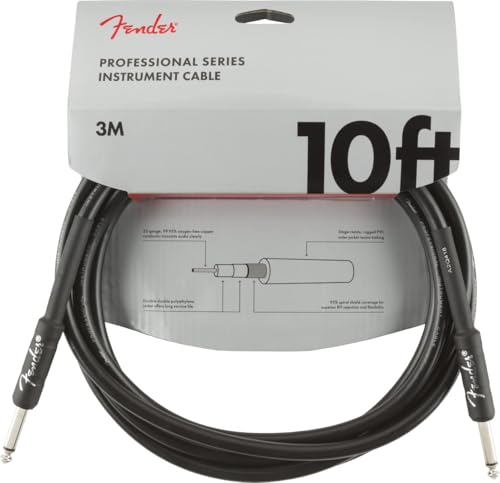
When you’re searching for a bass guitar cable that won’t let you down during those critical recording sessions or live performances, the Fender Professional Series Instrument Cable stands out with its impressive 95% oxygen-free spiral shielding that maintains flexibility while delivering exceptional signal clarity. The 8mm PVC jacket effectively minimizes noise interference, while the 22-gauge conductor guarantees enhanced signal strength that bass players particularly appreciate. You’ll notice the engineered design eliminates those frustrating twists and kinks that plague cheaper cables, and the nickel-plated connectors provide premium performance consistency. With its limited lifetime warranty covering defects under normal use, this 10-foot cable delivers the crisp, clean sound quality that serious musicians demand.
Best For: Musicians who need a reliable, high-quality instrument cable for electric guitars, bass guitars, and amplifiers during recording sessions and live performances.
Pros:
- 95% oxygen-free spiral shielding provides excellent signal clarity while maintaining cable flexibility
- Engineered design eliminates twisting and kinking problems common with cheaper cables
- Limited lifetime warranty covers defects under normal use, providing long-term value
Cons:
- 10-foot length may be too short for larger stages or studios requiring longer cable runs
- Higher price point compared to basic instrument cables
- Warranty becomes void if cable is altered, misused, or damaged accidentally
New Bee Guitar Cable 10ft Electric Instrument Bass AMP Cord (Right Angle to Straight)

Musicians seeking professional-grade signal clarity without breaking the bank will find exceptional value in the New Bee Guitar Cable 10ft Electric Instrument Bass AMP Cord, which features a practical right-angle to straight connector configuration that I’ve found particularly useful during cramped stage setups and studio sessions. The cable’s 22AWG oxygen-free copper conductors, combined with PVC insulation and double shielding, deliver impressive noise rejection that rivals more expensive alternatives. While the build quality won’t satisfy touring professionals who abuse their gear nightly, casual players and home studio enthusiasts will appreciate the significant improvement in sound clarity and minimal static interference this affordable option provides.
Best For: Casual players, home studio enthusiasts, and musicians on a budget who need reliable signal clarity and practical right-angle connectivity for cramped setups without requiring professional touring-grade durability.
Pros:
- 22AWG oxygen-free copper conductors with double shielding provide excellent noise rejection and signal clarity that rivals more expensive cables
- Right-angle to straight connector design offers practical flexibility for stage setups and studio sessions where space is limited
- Exceptional value for money with significant sound quality improvements over basic cables at an affordable price point
Cons:
- Build quality may not withstand the rigorous abuse that professional touring musicians subject their equipment to nightly
- Some users report concerns about long-term durability for heavy professional use
- Packaging quality has been noted as inadequate, though products typically arrive undamaged
Ernie Ball Braided Instrument Cable, Straight/Angle, 10ft, Black (P06081)

The Ernie Ball Braided Instrument Cable (P06081) stands out as an exceptional choice for bassists who demand both superior signal quality and long-term reliability, combining dual-conductor design with a tangle-resistant braided jacket that I’ve found particularly valuable during live performances. What impressed me most is its dual-conductor configuration, which delivers crisp highs, tight mids, and rich harmonics that preserve your bass’s natural character without unwanted noise interference. The gold-plated 1/4″ straight and right-angle connectors guarantee solid connections, while the multiple shielding materials effectively reduce handling noise that can plague cheaper cables during energetic stage performances.
Best For: Bassists and musicians who need a reliable, tangle-resistant instrument cable that delivers superior signal quality with crisp highs, tight mids, and rich harmonics for both studio recording and live performances.
Pros:
- Dual-conductor design with multiple shielding materials effectively reduces handling noise and preserves signal quality
- Tangle-resistant braided jacket makes it ideal for live performances and frequent setup/teardown
- Gold-plated straight and right-angle connectors ensure solid, reliable connections with excellent durability
Cons:
- At 10ft length, may be too short for larger stages or studio setups requiring longer cable runs
- Higher price point compared to basic instrument cables without braided construction
- Limited to black color option only, restricting visual customization choices for stage setup
JSAUX Guitar Cable 10 ft, Pro Audio Instrument Cable with 1/4 Tips

Budget-conscious bassists who refuse to compromise on audio quality will find their perfect match in the JSAUX Guitar Cable 10 ft, a surprisingly robust option that punches well above its weight class. You’ll appreciate the oxygen-free copper construction, which eliminates that annoying electrical humming that cheaper cables often produce during performances. The premium nylon braiding isn’t just aesthetic-it prevents tangling while maintaining flexibility for stage movement. What sets this cable apart is its thoughtful right-angle design on one end, making amplifier connections markedly easier in tight spaces. The thicker gauge provides superior sound isolation compared to standard cables.
Best For: Budget-conscious musicians who need a reliable, durable guitar cable that delivers professional sound quality without compromising on performance for live shows or studio recording.
Pros:
- Oxygen-free copper construction eliminates electrical humming and ensures stable signal transmission
- Premium nylon braided design prevents tangling while maintaining flexibility for stage movement
- Right-angle connector design makes amplifier connections easier in tight spaces
Cons:
- Some users report the cable diameter is thinner than expected despite claims of being thicker than most
- Limited to 10-foot length which may not be sufficient for larger stages or studio setups
- Unbalanced TS design may not be suitable for professional balanced audio applications
GLS Audio Instrument Cable for Bass & Electric Guitar (20ft)

Professional bassists who demand reliable performance without breaking the bank will find the GLS Audio Instrument Cable particularly compelling, since it combines oxygen-free copper construction with a distinctive braided tweed jacket that costs roughly half the price of comparable competitors. The 20-foot length provides excellent stage mobility, while double insulator shields guarantee maximum isolation from interference. Musicians consistently praise its clean signal delivery and vintage aesthetic appeal, though some express concerns about jack durability under extreme use conditions. For most gigging situations, this cable delivers professional-grade performance with impressive build quality that rivals more expensive alternatives.
Best For: Professional bassists and guitarists who need reliable performance and stage mobility at an affordable price point without compromising on sound quality.
Pros:
- Oxygen-free copper construction with double insulator shields delivers clean signal transmission with minimal noise interference
- Braided tweed jacket provides enhanced durability and attractive vintage aesthetic appeal
- Costs approximately half the price of comparable competitors while maintaining professional-grade performance
Cons:
- Jack quality may not withstand extreme use conditions for rigorous performers
- Potential long-term durability concerns compared to higher-end brands
- May not be suitable for musicians who require maximum durability under heavy professional use
Ernie Ball Instrument Cable, 1/4 Mono, Orange, 20ft (P06421)

Musicians who demand reliable performance without sacrificing flexibility will find the Ernie Ball Instrument Cable, 1/4 Mono, Orange, 20ft (P06421) delivers exactly what they need for consistent bass guitar connections. You’ll appreciate its ultra-flexible design that resists tangling, making stage setups and teardowns notably smoother than wrestling with stiffer alternatives. The 95% shielding effectively minimizes unwanted noise and interference, ensuring your bass signal reaches your amplifier with exceptional clarity and natural frequency response. I’ve found the compact connector design particularly useful in crowded pedalboard configurations where space becomes premium real estate. The roadworthy construction withstands regular gigging abuse while maintaining signal integrity throughout extended use.
Best For: Musicians who need a reliable, flexible instrument cable for bass guitars and other instruments in both studio and live performance settings.
Pros:
- Ultra-flexible, tangle-resistant design makes setup and teardown effortless
- 95% shielding provides excellent noise reduction and clear signal transmission
- Roadworthy construction built to withstand regular gigging and heavy use
Cons:
- Orange color may not suit all aesthetic preferences or stage setups
- 20ft length might be too long for some studio applications or too short for larger stages
- No mention of lifetime warranty or cable replacement guarantee
Factors to Consider When Choosing Bass Guitar Cables
I’ve tested countless bass cables over the years, and I can tell you that choosing the right one isn’t as straightforward as grabbing the cheapest option from the music store shelf. The cable you select will directly impact your instrument’s tone, reliability during performances, and long-term durability, making it essential to understand the key specifications that separate professional-grade cables from budget alternatives. Let me walk you through the critical factors I consider when evaluating bass guitar cables, including length requirements, connector quality, signal preservation features, construction materials, and shielding effectiveness.
Cable Length Requirements
When selecting the right bass guitar cable, length isn’t just about reaching from your instrument to your amp-it’s a critical factor that directly impacts your sound quality, stage mobility, and overall performance experience. I’ve learned that the sweet spot typically falls between 10 and 20 feet, depending on your specific needs and setup requirements.
For most live performances, I recommend 10-foot cables since they preserve signal integrity better through reduced capacitance and resistance, while providing adequate reach for close-quarters setups. However, if you’re performing on larger stages or need increased movement flexibility, 20-foot cables offer that extra mobility without compromising too much on sound quality. Remember, excessive slack creates tangling hazards and unnecessary complications during performances.
Connector Types Available
Choosing the right connector type often determines how reliably your bass signal reaches your amplifier, and while the technical differences might seem minor, they can profoundly impact your overall sound quality and performance reliability. I’ve found that most bassists need 1/4 inch TS connectors, which handle unbalanced signals perfectly for standard setups. However, if you’re dealing with longer cable runs or noisy environments, TRS connectors offer balanced signal transmission that reduces interference considerably. Right-angle connectors become essential when space is tight, preventing those frustrating cable kinks that always seem to happen at the worst moments. Gold-plated connectors cost more upfront, but their superior conductivity and corrosion resistance make them worthwhile investments for serious players who demand consistent performance.
Signal Quality Features
Although cable construction might seem like technical minutiae that only audio engineers care about, the internal components of your bass cable directly affect how your instrument’s signal travels from pickup to amplifier, making these seemingly invisible features essential for achieving professional sound quality. I prioritize cables with oxygen-free copper conductors, which eliminate impurities that cause signal degradation and unwanted noise interference. Double shielding systems, combining conductive PVC shields with spiral shields, create barriers against external electromagnetic interference that can muddy your tone. Low resistance ratings and consistent wire gauge, typically 22AWG or 23AWG, guarantee strong signal transmission without distortion. Gold-plated connectors provide superior conductivity while resisting corrosion, and durable jacket materials maintain flexibility during performances while protecting internal components from wear.
Durability and Construction
Because studio recordings and live performances subject bass cables to constant flexing, coiling, and occasional trampling by bandmates, I’ve learned that construction quality separates cables that last for years from those that fail mid-performance. I prioritize braided jackets made from nylon or tweed cloth, which resist wear, tear, and kinking far better than standard PVC coverings. Double shielding designs with spiral wrapping prevent tangles while maintaining signal integrity, something I appreciate during hectic stage setups. Gold-plated connectors offer superior conductivity and corrosion resistance, ensuring stable connections that won’t degrade over time. High flexibility remains essential for performers like myself who constantly reconfigure equipment, making tangle-free, roadworthy designs worth the investment for reliability.
Interference and Shielding
While rugged construction protects cables from physical damage, even the most durable bass cable becomes useless if electromagnetic interference corrupts your signal, creating unwanted noise that can ruin both studio recordings and live performances. I’ve found that double shielding techniques, combining conductive PVC with oxygen-free copper spiral shielding, effectively block electromagnetic interference from stage lights, amplifiers, and wireless equipment. High-density shielding materials create barriers against radio frequency interference that plague many venues. The conductor gauge matters considerably, with 22AWG or 23AWG offering better signal strength and reduced resistance compared to thinner alternatives. Gold-plated connectors resist corrosion while maintaining secure connections that preserve shielding integrity. Without proper interference protection, you’ll hear annoying buzzes, hums, and radio bleed-through that compromise your bass tone’s clarity and punch.
On a final note
After testing numerous cables, I’ve found that investing in quality pays dividends for bass performance. Whether you’re tracking studio sessions or performing live gigs, these cables deliver reliable signal transmission without breaking your budget. I recommend starting with the Fender Professional or Ernie Ball options if you’re serious about tone quality. Remember, your chain’s only as strong as its weakest link – don’t let cheap cables compromise your sound.

